I’d spent over a decade cleaning up their messes.
The Chandlers, a family so polished on the outside they gleam like diamonds, but inside?
They’re more like broken glass, leaving shards of secrets for people like me to pick up.
Only, they never see me.
To them, I’m invisible—just another piece of furniture or a means to their luxurious laziness.
But I see them. And I know things.
More than they’d ever want me to.
And now, they think they can get rid of me, like I’m nothing?
Like I haven’t spent nearly half of my life raising their children, caring for their home, and cleaning up after their secrets…
Living on a pittance because I got free room and board.
They don’t know it yet, but they’re about to regret every single thing they’ve ever done to me.
Calm Before the Storm
The first time I saw the estate in upstate New York, I thought it was the most beautiful place I’d ever laid eyes on.
I had crossed the border just a year before, smuggled into a country that promised better opportunities but didn’t mention how hard it would be to find them.
I was only 17, desperate for work, anything to send money home to my family, and the Chandlers took me in like a stray.
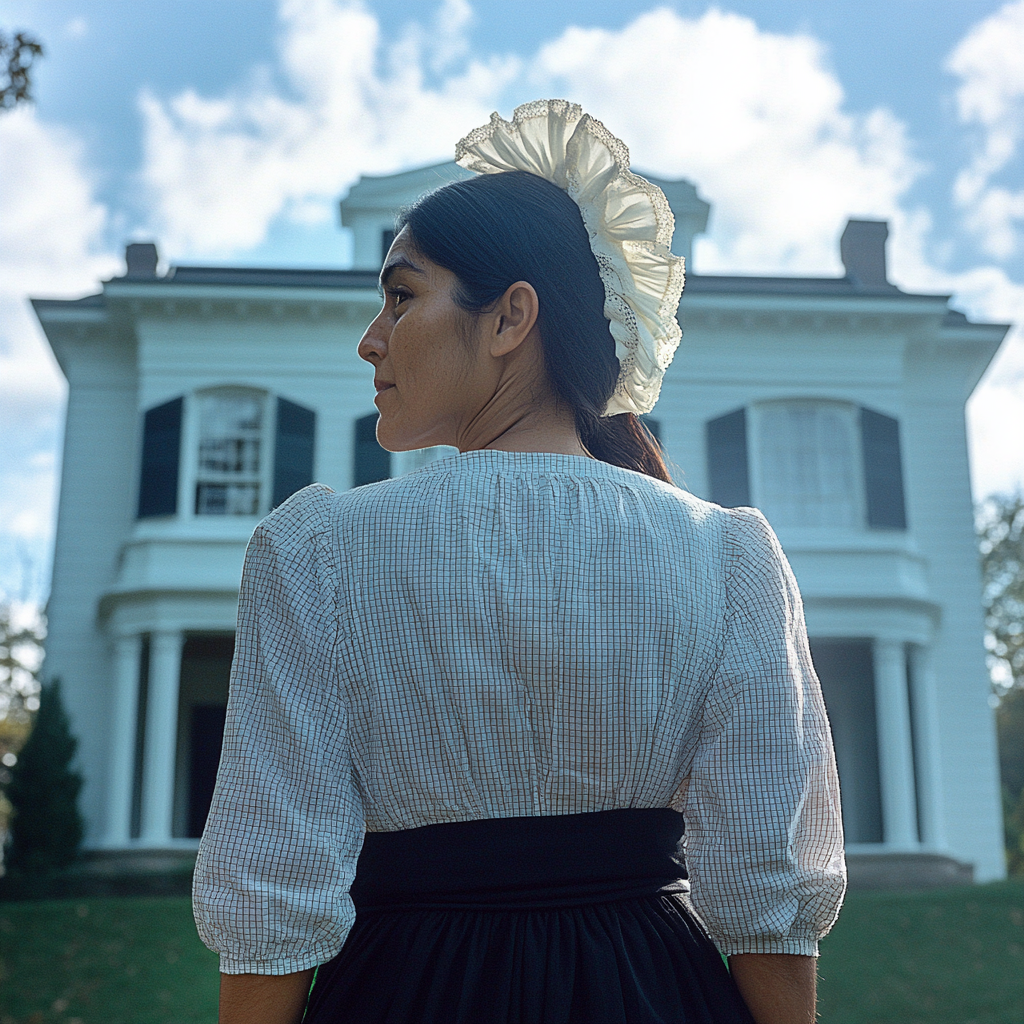
That’s how Mrs. Chandler put it, anyway. “Like a stray,” she had said with that tight, fake smile, the kind that never reaches her eyes.
Back then, I was grateful. I was young and scared, my English was broken, and I had no idea what my life would become.
The estate was like something out of a magazine, with its sweeping lawns and tall, glass windows that looked out over the Hudson River. It was peaceful. Quiet.
It’s funny how places that seem so beautiful can hide such ugly things.
Fifteen years later, I know this house better than I know myself. Every creaky floorboard, every locked drawer, every room they don’t show to their guests.
I know the hidden compartments where Mrs. Chandler keeps her pills, and the forgotten alcove where Mr. Chandler once took me aside and warned me never to speak of what I’d seen.
I didn’t. Not until now.
The Day It All Changed
The day everything changed, I was cleaning the library.
It’s the kind of room no one uses but insists on keeping for appearances—walls lined with leather-bound books no one has read, a fireplace that hasn’t been lit in years.
I was dusting the shelves when I overheard Mrs. Chandler on the phone, her voice drifting in from the next room.
“I think it’s time we let Maria go,” she said, her tone clipped, like she was discussing the weather.
They don’t know my English is now, nearly perfect.
Over the years, I learned it was better to be ignorant of the things going on in the house.
They still talk around me as if I’m invisible.
But that’s the thing about being invisible—it has its advantages.
When I heard her, my heart stopped. I froze mid-swipe, my hand trembling around the duster.
“We’ve kept her around long enough,” she continued, her voice sharp. “I’m not comfortable having an undocumented worker in the house anymore. We’ll give her a month’s severance. That should be enough for her, right? She can find another place. Maybe back in Mexico.”
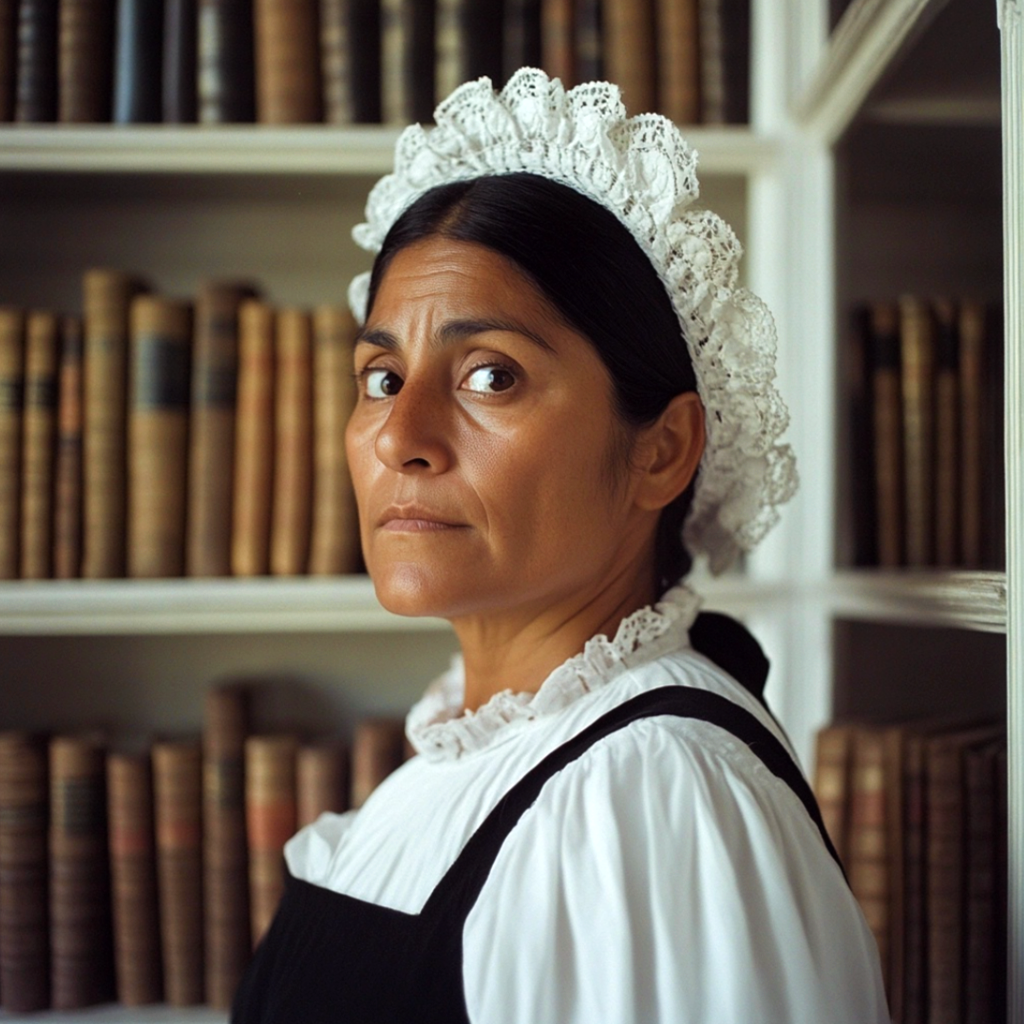
I couldn’t believe it.
How could I have been so stupid?
How could I have believed that the Chandlers cared about me, even a little?
Possibly there was a little bit of fear given how much I knew about them.
But I wasn’t the same scared, naive (undocumented) girl they had hired all those years ago. I had learned things.
In fact, I had been doing my homework, building my path to citizenship and saving every penny.
Building My Case
The next morning, I woke up with a plan. It was simple, really.
All I had to do was play the part I always had—the obedient, invisible housekeeper—while slowly setting everything in motion.
I started with the small things, things they wouldn’t notice right away.
I knew where all the skeletons were buried, figuratively speaking.
It was just a matter of gathering the right information, building my case piece by piece.
But I had to be careful. I couldn’t rush. They still trusted me, and that was my advantage.
Setting the Stage
It didn’t take long for the cracks in the Chandlers’ perfect facade to widen.
The family had always been unstable, held together by lies and the fear of what the outside world would think if they ever saw the truth.
All I had to do was push in the right places.
I’ve watched them build their lives around lies and money, watched them hollow out every promise they ever made to each other.
Every time Richard brings one of his mistresses up here, or Clarissa swallows another pill to numb herself to the reality of her life, I wonder what it’s like to live so completely disconnected from your own soul.
They think they’ve boxed me in with their wealth and their papers—the fake Social Security number, the under-the-table payments—but they’re wrong.
This morning, while I was changing the sheets in the guest bedroom, I found one of Clarissa’s pills lodged between the mattress and the bedframe. Little pink things.
She thinks I don’t notice when she pops them like candy, thinks I’m too stupid to understand that her glassy-eyed smiles aren’t just from the champagne.
I pocketed the pill without a second thought. I know better than to leave evidence where it doesn’t belong.
Beatrice, their daughter, is the only one who ever talks to me like I’m real. She’s different from her parents, more fragile, like a vase balanced on a windowsill, one gust away from shattering.
She spends most of her time here, hiding from the city, from the pressure of being a Chandler.
“Maria,” she whispered one morning, her face pale and drawn, “Do you ever feel like… like you’re drowning in everything you can’t say?”
I remember nodding, not trusting myself to speak.
Crumbling Foundations
Richard left for the city the next morning.
Good. I preferred the house without him, anyway. It made everything quieter, easier.
I stood by the kitchen window, watching as the car disappeared down the long driveway, thinking about the documents I had slipped into my apron pocket the night before.
I’d cleaned up after their dinner on the patio, the usual mess of wine glasses and crumpled napkins, and found them tucked carelessly under Richard’s briefcase.
Papers detailing his next real estate venture. His signature scrawled at the bottom. More bribes, more deals, more families set to lose their homes so men like Richard could sit atop their stacks of money.
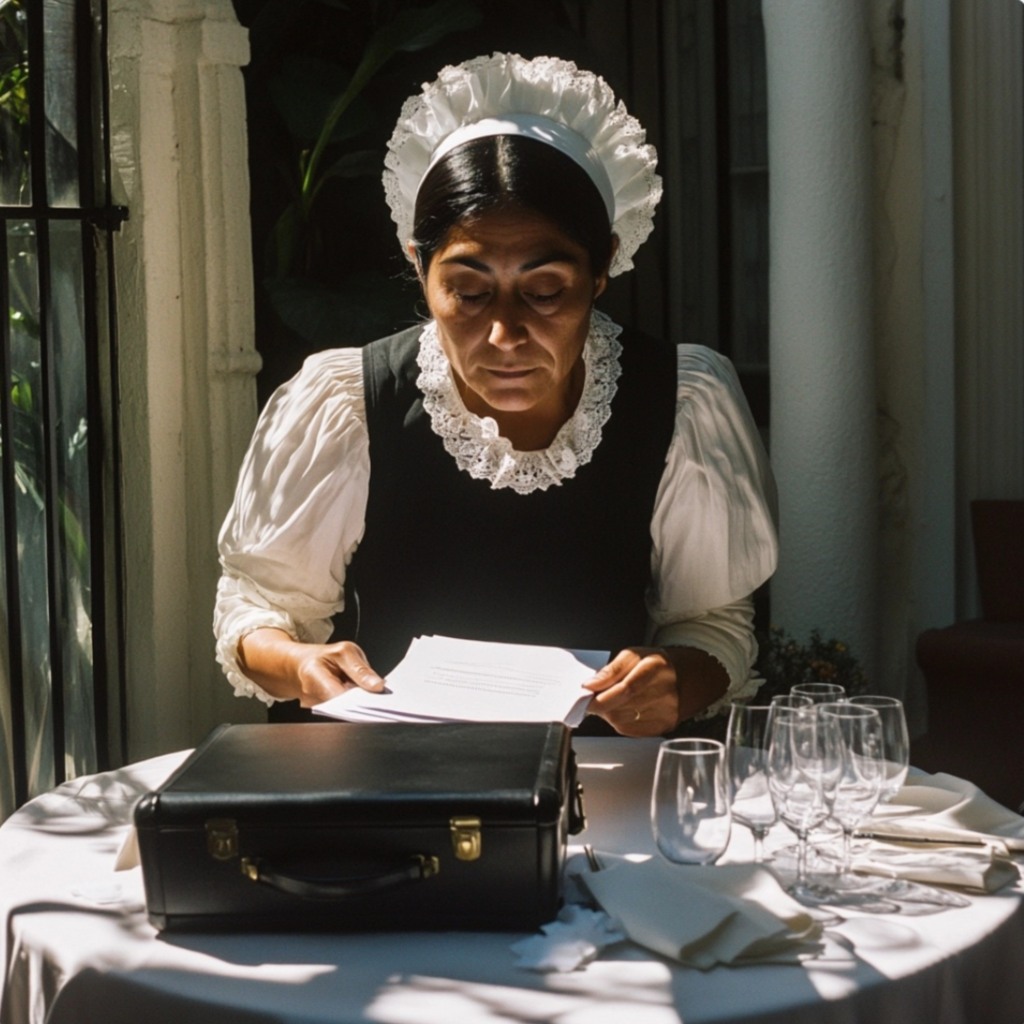
It was exactly what I needed.
Clarissa spent the morning in her usual routine, alternating between yoga and phone calls with friends she didn’t really like.
I went about my tasks as always—dusting, cleaning, quietly making myself invisible.
I was in the kitchen preparing lunch when I heard her slamming the door of the bathroom. I knew the sound too well. A bad day.
The silence stretched for a few minutes, then her voice cracked through it, thin and sharp.
“Maria!”
I walked calmly toward the bathroom, my steps even, my expression carefully blank. I found her sitting on the bathroom floor, her hair a mess, her hands trembling.
The usual bottle of wine sat on the sink’s edge. It hadn’t been there this morning.
“Maria, help me,” she slurred. “I can’t… I can’t do this anymore.”
Her weakness, the desperation in her voice, it used to make me feel something. Sympathy, maybe. Pity, even.
But not anymore.
I kneeled next to her, grabbing a towel and dabbing at her forehead, soothing her with quiet words, though they barely registered.
“Shh, Clarissa,” I whispered. “Everything is going to be fine.”
She didn’t know it yet, but I was telling the truth. Everything would be fine—for me.
Weakening Links
Later that afternoon, Bea found me in the kitchen, as she often did when things got bad with her mother.
She looked tired, her eyes rimmed with red. I knew she’d heard the morning’s episode, and it weighed on her like it always did.
“She’s getting worse,” Bea said softly, sitting at the table, staring at her hands. “I don’t know how much more of this I can take.”
I didn’t respond immediately. I wasn’t here to comfort her. Bea, for all her differences from her parents, was still a Chandler.
But Bea… Bea was different, at least in some ways. There was something fragile about her, something that hadn’t yet been tainted by the greed that consumed her family.
“She’s not well,” I said, my voice soft but firm. “You should think about getting her help. Real help, not just the pills and the wine.”
Bea’s eyes flicked to mine, and for a moment, I thought I saw something there—something that recognized the truth in what I was saying.
But just as quickly, it disappeared, and she shook her head, her voice small and broken.
“Dad won’t pay for that. He says it’ll look bad. She’s supposed to… keep it together for appearances, you know?”
I nodded, knowing too well what appearances meant to this family. They would rather watch themselves burn than admit they needed help.
“Maybe there are some things even your father can’t control,” I said, my words quiet, knowing Bea wouldn’t fully understand their meaning just yet.
I knew she loved her mother, in her way.
And part of me wanted to spare her from what was coming. But another part, the part that had been building inside me for years, knew I couldn’t let her sympathy get in the way of what needed to be done.
Setting Up the Scenario
The papers I had taken from Richard’s briefcase were still hidden beneath my mattress, carefully folded and waiting for their moment.
I had spent the last few days making small calls, sending emails under anonymous names, planting seeds of doubt among Richard’s business partners and the developers he was working with. It was easy, really.
People are so quick to believe in rumors when they think it’ll benefit them.
Paul Howard, Richard’s closest friend and partner, was the one I targeted first. He trusted Richard, but not completely.
No man like him trusted anyone completely. It didn’t take much to make him question what Richard was up to.
A few well-placed tips to the right people, a couple of whispered accusations, and Paul was calling Richard more frequently, their conversations tinged with suspicion.
I knew Paul wasn’t innocent in any of this. He was involved in Richard’s dirty dealings just as much, if not more.
But unlike Richard, Paul didn’t know someone was watching. And that was his mistake.
Later that evening, I served Clarissa her dinner in bed. She hadn’t left her room all day, and I knew she wouldn’t tomorrow either. Her eyes were dull, her skin pale. She didn’t even look at me as I set the tray down beside her.
I could tell she wasn’t eating anymore—just drinking and swallowing whatever pills she had left.
“Is there anything else you need?” I asked, my voice as calm and neutral as ever.
She didn’t respond, just waved her hand dismissively, the motion slow and weak. I left the room without another word, but not before pocketing the remaining pills from the bedside table.
She wouldn’t need them soon anyway.
It All Comes Crashing Down
The next morning, Paul Howard arrived at the estate unannounced, his face tight with anger. I had been expecting this.
The whisper campaign had done its job. He was here to confront Richard, though he didn’t yet know how much more was about to come to light.
Richard, fresh from the city and oblivious to the storm brewing around him, greeted Paul with his usual arrogance, waving me away as if I didn’t exist.
But I stayed nearby, close enough to listen as they headed into Richard’s office. The shouting started soon after.
“You’re moving money out of the company without telling me?” Paul’s voice, usually so calm and collected, was filled with fury. “How long have you been lying to me, Richard?”
“I don’t know what you’re talking about,” Richard snapped, but I could hear the edge of panic in his voice.
Paul wasn’t buying it. “You think I haven’t noticed the missing funds? You think I haven’t heard the rumors? You’re setting me up to take the fall, aren’t you?”
It was all unfolding exactly as I had planned. Paul’s anger, Richard’s panic—this was just the beginning.
As the argument continued, Clarissa stumbled into the hallway, her robe hanging loosely from her shoulders, eyes half-open in a daze.
She leaned against the wall, listening, but barely processing what was happening. She was more ghost than person now, a shell of the woman she used to be.
I watched her, feeling that same tug of pity I had felt with Bea. But it was too late for pity now. Too much had been set in motion.
And Clarissa was no innocent bystander in this mess—she had been just as complicit, just as rotten.
As I left the scene, I wasn’t sure what got said, but I knew the fragile webs were disintegrating.
Strange Irony
The next day, the estate felt tense, like the air had been pulled too tight, ready to snap. Richard had gone to the city again, this time without a word to Clarissa.
He had left in a fury, after an all-night phone call with his lawyers. Paul was threatening to sue, to drag Richard into a very public scandal if his questions weren’t answered.
But Richard wasn’t the kind of man to cave to pressure. He was preparing for war.
Clarissa stayed in bed. She hadn’t spoken to me since the night before, but I knew why.
She was scared—scared of what Richard was hiding, scared of what her life was becoming. But even in her fear, she refused to take action. It was easier for her to sink deeper into her haze than to confront the truth.
Bea found me that afternoon, her face pale and drawn, more fragile than ever. Her hands shook as she held a crumpled piece of paper—a notice from the bank.
“They’re freezing the accounts,” she said, her voice small. “Dad told me not to worry, but… what if something’s really wrong?”
I didn’t say anything at first. I just watched her, watched the fear set in. Bea wasn’t like the others. She wasn’t cold or manipulative, not in the same way. But she was still part of this family, still trapped in the web they had spun around themselves.
“I don’t know what to do,” she whispered, her eyes wide with panic. “Everything’s falling apart.”
And it was. Everything she had been born into, the wealth, the security, the image—it was all unraveling.
But this time, I wasn’t going to fix things.
“Sometimes things have to fall apart before they can get better,” I said softly, echoing words I had once heard her mother say, back when Clarissa still cared enough to give advice.
Bea nodded, though I knew she didn’t understand. Not yet.
It all came to a head that evening, when Richard returned to the estate, his face set in stone. He called for Clarissa and Bea, summoning them to the grand living room like a king gathering his court. His movements were sharp, his temper barely concealed.
I hovered in the hallway, close enough to hear but invisible, as always. This was the moment I had been waiting for.
Clarissa, still in her robe, shuffled in, her eyes half-lidded from the pills. Bea followed behind her, her face pale, clutching the bank notice in her trembling hand. Richard paced in front of the fireplace, his anger simmering just beneath the surface.
“We have a problem,” Richard said, his voice cold and clipped. “Paul’s been digging into the accounts, and he’s found something. There’s no easy way to say this: we’re in serious financial trouble.”
“Dad, what do you mean?” Bea’s voice wavered.
“I mean,” Richard said through gritted teeth, “that Paul is accusing me of embezzlement. And if he goes public, it will ruin me. It will ruin us.”
For a moment, there was silence. The weight of his words hung heavy in the room. I could practically feel it in the air, the final realization that their carefully crafted world was crumbling.
Clarissa spoke first, her voice hoarse. “You’re saying we’re… broke?”
Richard turned to her, his expression hard. “Not yet. But we will be if this goes public. And Paul is already threatening to sue. He wants me out of the company.”
Bea sank into a chair, staring blankly at the floor. “What do we do?”
Richard ran a hand through his hair, his calm slipping for the first time. “I don’t know. I’ve got some funds hidden away, but the lawyers are onto them. If they freeze those accounts, it’s over.”
They didn’t know how close they were to losing everything. But I did.
The Final Straw
I waited until the next morning to make my final move.
By then, the estate was suffocating under the weight of the Chandlers’ panic. Richard had retreated to his office, furiously making calls to his lawyers. Clarissa stayed in her room, drinking herself deeper into oblivion. Bea, fragile as ever, wandered the grounds like a ghost.
That’s when I made the call to Paul.
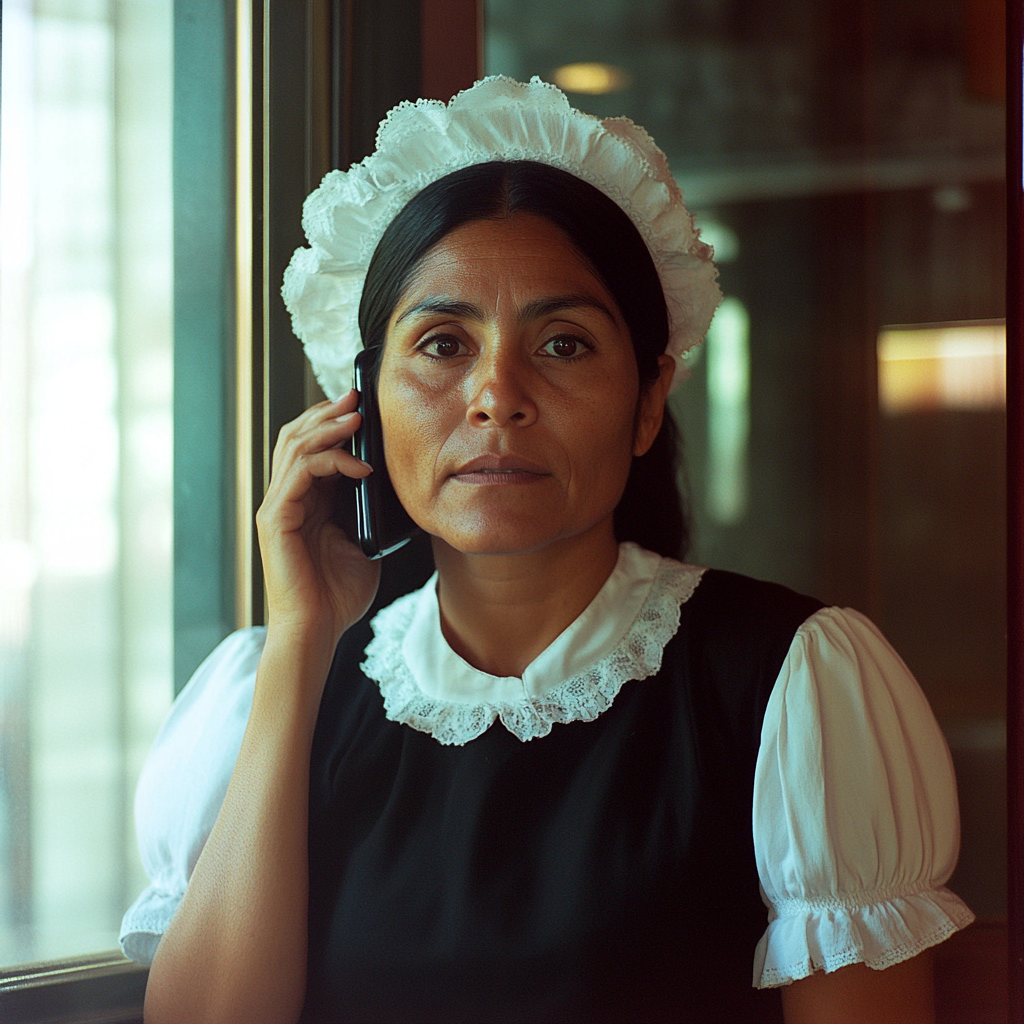
I had been planting the seeds for weeks—careful whispers, anonymous emails, quiet tips to his contacts about Richard’s offshore accounts and his long history of bribery.
Paul was angry and desperate enough to listen.
But today, I gave him the final piece of the puzzle: the documents I had taken from Richard’s briefcase.
They detailed everything—the illegal deals, the hidden assets, all of it.
I told Paul that I found them while cleaning, that I didn’t know what they meant but thought he should see them.
Within hours, Paul’s lawyers were moving forward with a full investigation.
The day it all fell apart was surprisingly quiet. There were no screaming matches, no dramatic confrontations. Just the slow, agonizing collapse of a family that had spent too long believing they were untouchable.
Richard was the first to leave. After Paul’s lawyers filed the suit, the news broke across every financial outlet. “Richard Chandler Accused of Embezzlement in Multimillion-Dollar Scandal,” the headlines screamed. The board of his company ousted him within hours, and his remaining assets were frozen.
He packed a suitcase and left without saying a word to Clarissa or Bea.
Clarissa wasn’t far behind. With no money left to fund her lifestyle, she retreated to the city, where she could drink herself into oblivion without anyone noticing. She didn’t even glance at me as she left.
But Bea… Bea stayed.
She didn’t talk to me much anymore. She didn’t talk to anyone. The weight of her family’s collapse hung over her like a shadow.
She found me in the garden. She stood silently for a moment, watching as I pruned the roses, before finally speaking.
“They’re gone, aren’t they?” she asked, her voice small.
I looked up at her, nodding slowly. “Yes.”
“I don’t know what to do,” she whispered.
For a moment, I felt something—pity, maybe, or guilt. But it passed as quickly as it came. Bea wasn’t responsible for her family’s downfall, but she had been a part of it.
So I said nothing. I just went back to tending the roses, letting Bea’s silence fill the space between us.
As I stood in the garden that evening, the estate finally empty, I thought about everything that had led to this moment. Richard, Clarissa, Bea—the Chandlers had all crumbled under the weight of their own greed and neglect.
They had built their lives on lies and money, and now those lives were gone.
But here’s the thing about irony—it doesn’t always strike where you expect.
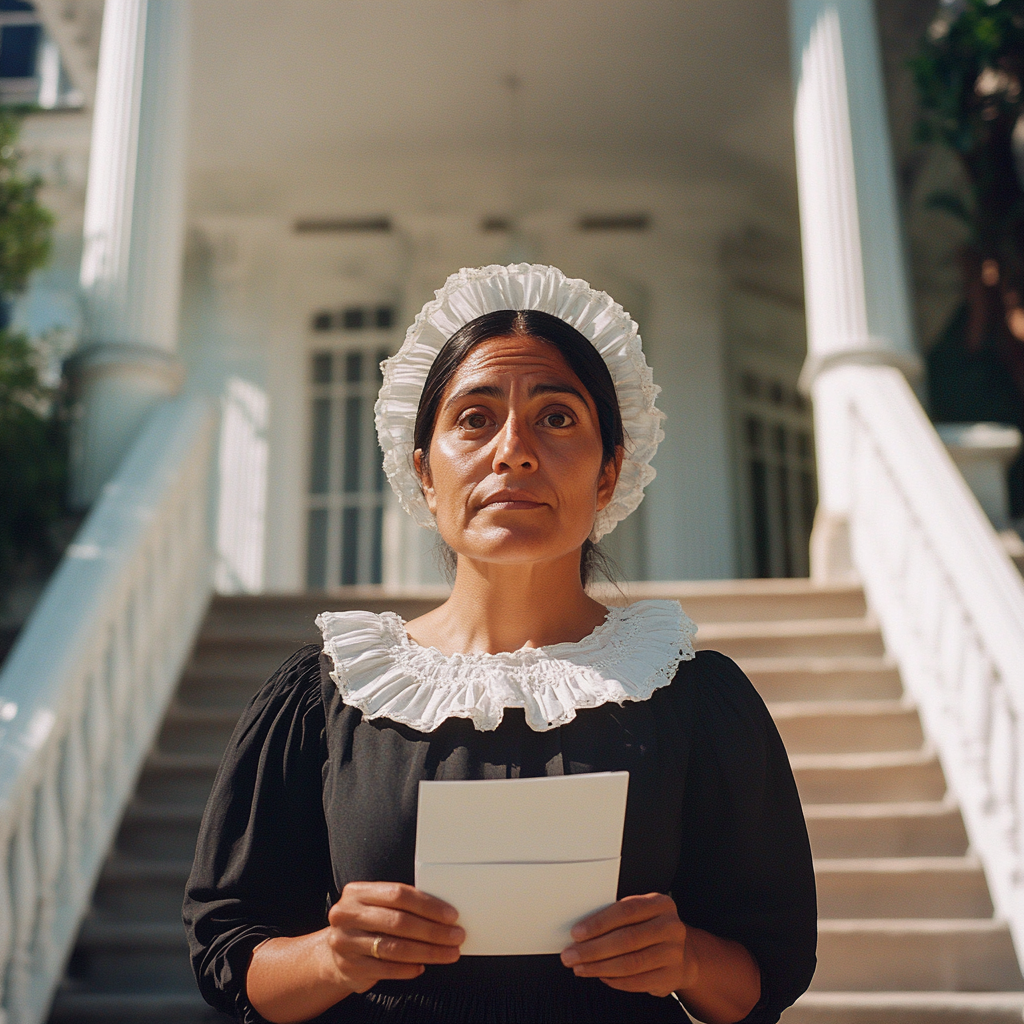
Two weeks later, a letter arrived at the estate. It was addressed to me. Inside was a legal document, a surprise twist in the story I hadn’t anticipated: Bea, in the final act of her family’s unraveling, had named me as the estate’s caretaker in her absence.
She was leaving for Europe, she wrote, to find herself. She couldn’t bear to stay in a place filled with so many memories, so much pain. But she trusted me.
The estate, for all intents and purposes, was mine to manage.
I stood there on the steps of the grand house, the letter in my hand, and I couldn’t help but shake my head.
The irony was almost too perfect.
